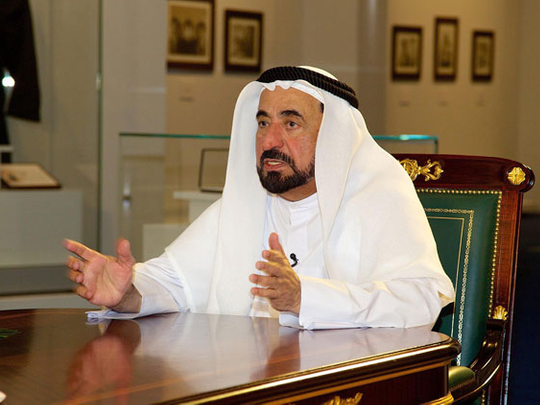
Sharjah: The ruler of Sharjah has spoken of his determination to reach out to citizens in a lengthy interview in which he detailed his writings and touched on the history of the UAE.
His Highness Dr Shaikh Sultan Bin Mohammad Al Qasimi, Supreme Council Member and Ruler of Sharjah, emphasised that he has not isolated himself from the people, and thus has launched new initiatives and channels of communication to connect with people and help solve their issues and problems.
In a televised interview with Sharjah Radio and TV at the Dara Centre for Gulf Studies, Shaikh Sultan highlighted his last editions on the history and geography of the region and explained the political, cultural, social and humanitarian dimensions of the three new editions, which are being featured at the 31st Sharjah International Book Fair.
His recent publications are; Hadith Al Zakira-Part II, Al Qwasim and the British Aggression, and Correspondence of Sultans of Zanzibar, covering political, social, cultural topics.
The three books document historical events and provide information on major milestones and developments in the Arab region .
He also spoke about the various stages of the formation of the Arabian Peninsula, and continuous British attempts to tarnish the struggle against their colonialism.
Shaikh Sultan said: “The Arab and Islamic affiliation to the UAE was based on a national root from the beginning, the same as was the interaction between the people and their leadership.
“It so happened that the Late Shaikh Zayed Bin Sultan Al Nahyan once opened the door of his Council for demonstrators to enter. This act embodied the cohesion existing between the Ruler and the ruled, which later spurred the success of the march of the Union as an Arab identity. Such an act of cohesion within the Union — the affiliation to the UAE — bothered the Shah and the British,” Shaikh Sultan noted.
He added that the municipal leaders and members come from among the people of their areas closest to them, in order that their situation and problems were clearly understood.
During the interview, Shaikh Sultan spoke about the importance of the Dara in scientific research, as also for the historical and political research, which it presented about the Gulf region.
Shaikh Sultan also highlighted the stages of human inhabitants in the Arabian Peninsula saying, “The area was connected to Africa and it was said that human existence was stationed in Ethiopia and there are plenty of studies about it. Some remains of human inhabitants were found in Mleiha-Sharjah, which were similar to those found in Ethiopia, suggesting that man had passed through this region before moving to Asia.”
He also talked about the influence of other people who migrated to the region in the past, such as the Persians who had a big impact on it, till the arrival of Alexander the Great, who conquered the region.
Developments in the Levant throughout various historical stages were also highlighted in his books. He spoke about the ancient civilization of Palmyra in Syria and its Queen Zenobia
“There was a large kingdom in the Levant, which extended to the shores of the Arabian Gulf in 272 AD. This kingdom established ports on the eastern coast of the Peninsula came into contact with India and became as strong as the Romans. Some of the remains of that kingdom such as Zaba Palace are still in Ras Al Khaimah,” the Ruler of Sharjah said.
He also threw light on the Abbasid and Umayyad eras and the Mongol Invasion of Baghdad in 1258 when they seized Baghdad and killed the last Abbasid Caliph.
And he recalled going to where his wife Shaikha Jawaher Bint Mohammad Al Qasimi was sitting after finishing up with the doctorate dissertation and handing her a copy of the dissertation where he has written a thank you note for her support during the preparation of the doctorate.












